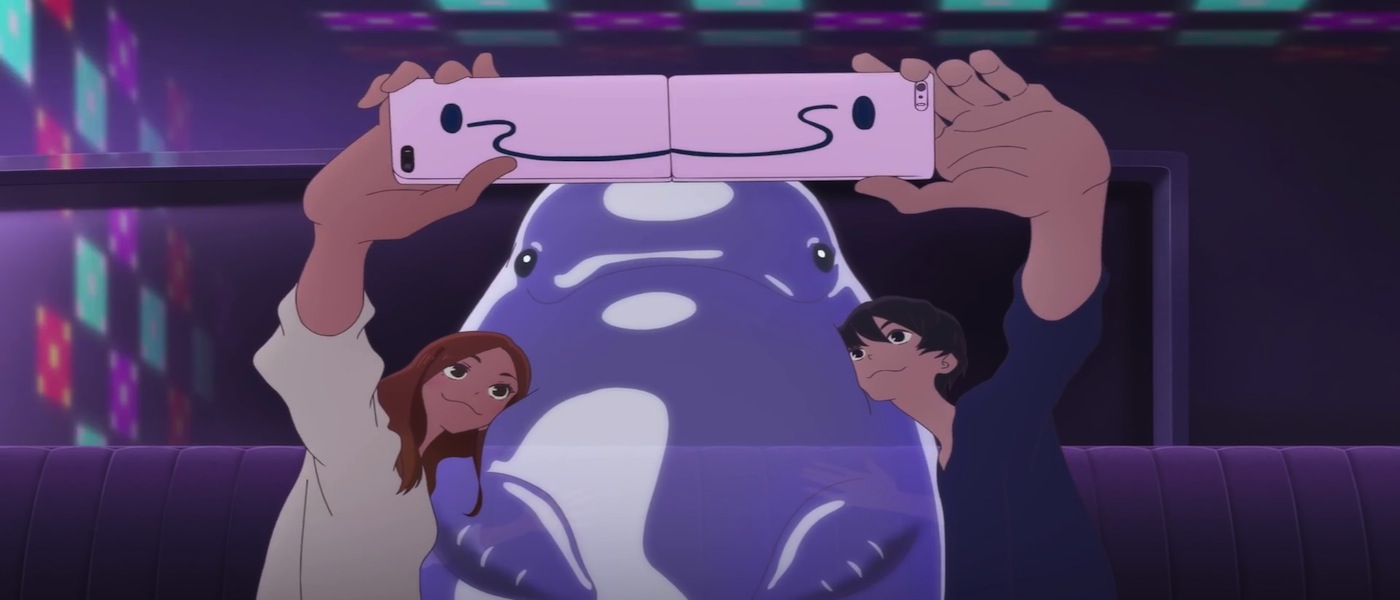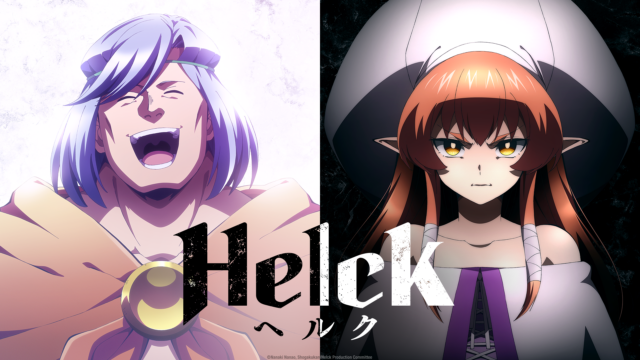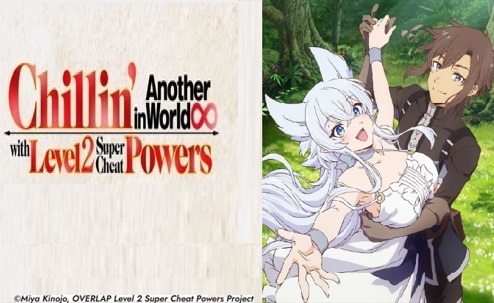English Dub Review: Ride Your Wave
Overview:
Ride Your Wave presents the human story of Hinako Mukaimizu, a 19 year-old who moves to a new coastal town and in spite of her future being ahead of her, she’s not concerned with much beyond her passion towards surfing. Hinako meets Minato Hinageshi, a 21 year-old firefighter who’s decidedly more driven about life. A whirlwind romance ensues between the two of them and just as they begin to open up to each other in new ways a tragic accident claims Minato’s life. Hinako is destroyed over the loss of Minato, but she soon discovers that whenever she sings the special song that they shared together, he’s able to materialize in a nearby body of water. These bizarre circumstances set off Hinako and Minato’s relationship in unexpected ways in a very tender love story about finding your bliss, the joys and pains of love, and the importance of discovering your bliss.
Our Take:
Masaaki Yuasa isn’t just a highly accomplished animation director, but it’s fair to say that he’s made some of the most beautiful animated films of the past decade. I’d honestly say that every single one of his film’s would be in my top ten animated movies of all time and that’s to say nothing of the groundbreaking work that he’s done on television, such as series like Kaiba, Ping Pong The Animation, Tatami Galaxy, and the recent Keep Your Hands Off Eizouken! Yuasa plays by no rules and he pushes the boundaries of animation beyond what you’d think they’re actually capable of.
Yuasa’s a director where you actually lament the fact that the human body realistically needs to blink every so often and there will be frames of his work that you’ll inevitably have to miss. His output has only become more rampant in recent years, but right from the jump Ride Your Wave has been advertised as something that looks much more “normal” by Yuasa’s standards. While that is true with Ride Your Wave, thankfully it is still a triumph of animation and an incredibly enjoyable experience.
Curiously, one of the biggest hurdles that Ride Your Wave faces is similar to the same struggles that beset Makoto Shinkai’s film from this year, Weathering With You. Both are exceptional films in their own right, but they touch on similar territory to what the directors’ previous films tackle. In this sense, Yuasa’s Ride Your Wave is at least more successful and feels more original as a follow-up feature than Shinkai’s Weathering With You is to Your Name.
Ride Your Wave has a lot to do with water, which is also the main component of Yuasa’s previous feature, Lu Over the Wall. The matter is that Lu does wondrous, highly stylized things with the limits and physics of water, whereas Ride Your Wave displays the liquid in a much more pristine, romanticized light. There are still unbelievable, supernatural things that happen to water in this movie, but it’s all filtered through a surprisingly grounded perspective. Lu Over the Wall plays with vampire mermaids who want to groove out in rock bands, whereas Ride Your Wave is satisfied with looking at the simple beauty in surfing and the literal ebb and flow of the gentle sport (and life).
There’s so much care and attention to detail that’s put into the surfing sequences where it’s clear how much planning and work was involved here with everything from the character models to the environments. The visuals here may not break your mind in the same way that Lu Over the Wall’s do, but they still astound and will make you want to pick up a surfboard and hit the beach more than anything else.
The character work in Yuasa’s films is always one of the director’s greatest strengths. He creates deeply relatable, authentic characters who will tug at your heart strings both as individuals and in terms of the tender romances that grow between them. Ride Your Wave is no exception here and the relationship between Hinako and Minato is easily one of the best things about this movie. Joey Richter and Merit Leighton are fantastic in the two central roles, but the entire dub cast does talented work here. Very quickly into this film I was bawling my eyes out over the connection that these characters share.
The biggest difference here between Ride Your Wave and Yuasa’s other love stories is that where those other films play it coy and let the tension build before the romance can be reciprocated, Ride Your Wave nearly immediately puts its lovebirds together. With the direction that the film ultimately takes, there’s an explanation and an agenda behind this atypical structure, but it still mixes up the flow of the movie in a refreshing way where the first act just allows these characters to bask in their love.

Yuasa can be a director that indulges in extremes, but he understands that less can be more when it comes to romance. Just listening to the imperfect, giggling quality of these performances while Hinako and Minato sing together nearly brought me to tears. It captures their entire dynamic purely through intonation (the use of music in general and how it reflects a strong bond between people is another important area in which the film excels). The same can be said about simple non-moments that Hinako and Minato share, like eating burgers together.
Yuasa conveys gallons of depth through innocent gestures, which just highlight this realistic couple as they’re at ease with themselves. Yuasa just gets it. It’s such an effortless way to let audiences into their world and relationship. Yuasa constantly plays with this in a way where you feel like you’re sneaking up on Hinako and Minato as you witness their personal, private moments. You just want to spend time with them, see them be happy, and never leave their sides.
Ride Your Wave initially feels fairly predictable once Hinako and Minato get together and because this happens so quickly it dispels the typical romantic tension of these films. Accordingly, Ride Your Wave needs to create anxiety in other ways, like with Minato’s gutting death and how it begins to play with the typical pacing and structure of a film of this nature, even if it still does cover many of the same beats. The way in which Ride Your Wave gets creative and loose with these elements is when the film is at its best and is the least predictable, but even when it lays into the stereotypes it still presents a very entertaining narrative that connects, despite the audiences’ familiarity with this kind of story.
Hinako’s situation is so inherently tragic that it’s hard to not be reduced to tears in the same way that she is every time that she and Minato are forced to part ways. On some level this film is an allegory about co-dependence and how even though the unity of a relationship can be empowering, it’s also important to find your purpose and come into your own as an individual. As much as this is a story about Hinako and Minato’s love, it’s even more about Hinako gaining independence and becoming even stronger as a person.
The unpredictable, aggressive waves that a surfer attempts to tame are symbolic of the twists and turns that life can take. There’s also no irony lost on how Hinako’s passion towards surfing can also be emblematic of how she coasts through life before she meets Minato. Nothing in this film is a coincidence and even though it’s arguably a simple story, it is also filled with depth and symbolism.
In spite of the mild “criticisms” over how normal this film is, this is still a movie where a girl walks around with her beau trapped in the aquatic shell of a whale while not blinking an eye. So perhaps Yuasa’s high concept, higher visual level of storytelling has almost desensitized me to how weird this film actually is at times. The purity of the film’s romance even results in a certain numbness to the gonzo content and circumstances of Hinako and Minato’s love story. Hinako may be talking to her soul mate while he’s several inches tall and confined to a glass of water, but the romance is so genuine that it’s what becomes the focus in these scenarios.

Of course, another wonderful dynamic of Ride Your Wave is the considerably darker interpretation that the film wisely never outright discourages. It’s very on brand for Yuasa to tell this fantastical story about a boy’s ghost who is trapped to a watery prison that’s awakened through the power of song. However, another very valid reading of this story is that Hinako is just so messed up over the death of her boyfriend that she’s imagining the whole thing. There are a few moments where characters give Hinako the side eye as she enjoys her “romantic dates” with Minato’s spirit, as if this is just a girl who’s lost in her mind. Both interpretations lead towards the same conclusion where Hinako needs to move on and accept life, but it’s appreciated that Ride Your Wave entertains both ideas and makes debate possible. It honestly adds a lot to the movie.
The film’s final half hour is the most elaborate and it visually becomes the kind of film that’s more expected from Yuasa. However, it almost means even more this time around since Ride Your Wave holds off on the stylized look for so long and waits until its conclusion to pull out all the stops. Yuasa’s standard production company, Science SARU, once again handle animation duties and they don’t struggle with bringing Yuasa’s vision to life.
It’s this final act that especially pushes the film’s themes about moving on and how important it is to give someone else freedom so you can gain your own, even if it’s difficult and is going to hurt. It’s a powerful message, but a fundamental lesson for Hinako to grasp or else she’ll always be stuck in the past. Hinako’s growth as a person is the most important journey in the film, but the supporting characters, Wasabi (Minato’s friend) and Yoko (Minato’s sister), also make progress of their own. Both characters experience powerful, believable development as they process the loss of Minato. Much like Hinako, they’re in different, healthier places by the end of the movie.
As much as Yuasa’s creative eye is to thank for this film’s powerful impact, a lot of credit is also owed to acclaimed screenwriter, Reiko Yoshida, who’s responsible for the script. Yoshida has tackled Yuasa’s more recent theatrical efforts like Lu Over the Wall, but also been apart of other prestigious productions, like A Silent Voice, The Cat Returns, and a vital voice within the Violet Evergarden series. Yoshida’s more restrained, grounded nature is evident in her other screenplays and it’s also very much present here. In many ways this is easily Yuasa’s most “normal” and grounded feature film. Yoshida’s script feels largely responsible for this, but it also feels like Yuasa is aware that this is less weird than his other endeavors and so—while still beautiful—he de-crazies his typically bonkers animation style in favor of something that shows more restraint and doesn’t try to overshadow Yoshida’s powerful script.
Michiru Oshima is the film’s composer and Oshima’s score is a constant highlight. It knows when to ramp things up and become especially “plunky” to convey the awkward first steps of Hinako and Minato’s relationship, but it’s also understated and more subtle a lot of the time, too. The boy band Generations from Exile Tribe are responsible for the film’s theme song, “Brand New Story,” which also doubles as the love ballad that Hinako and Minato share. “Brand New Story” is maybe a little too sweet at times, but it’s still highly appropriate for the film and these lovesick characters. The way in which “Brand New Story” bleeds into the background of many scenes as Hinako’s thoughts over Minato become more intense is also really effective. All of this music comfortably compliments Ride Your Wave’s visuals to create a strong overall package.
Ride Your Wave is an absolute triumph and underneath its fantastical framework of surfing, music, and love is one of the more creative and inspiring stories about grief and loss that you’ll come across. It pairs its delightful visuals with some very heavy subject matter in a way that feels like a small step forward for Yuasa. Ride Your Wave may amount to “lesser Yuasa” in the end, but that still means that it’s one of the most gorgeous films that you’ll see this year and that it contains an exceptionally moving love story that will melt your heart. Hinako and Minato are some of the most enjoyable characters from out of Yuasa’s filmography and it’s impossible for their infectious magic to not rub off on you. If you’re able to catch this in theaters, it’s a must-see experience that will inspire everyone out there to not only go and find their wave, but ride it, too.
























Hi Ashley, thank you so much for reading and we love the feedback. Note that on that day we had 14th posts go up and only ten posts show on the front page, so it's possible the preview had already been archived by the time you got to it. One recommendation would be to add our RSS feed to your favorite news aggregator service like Feedly, this way you get all of the latest posts!